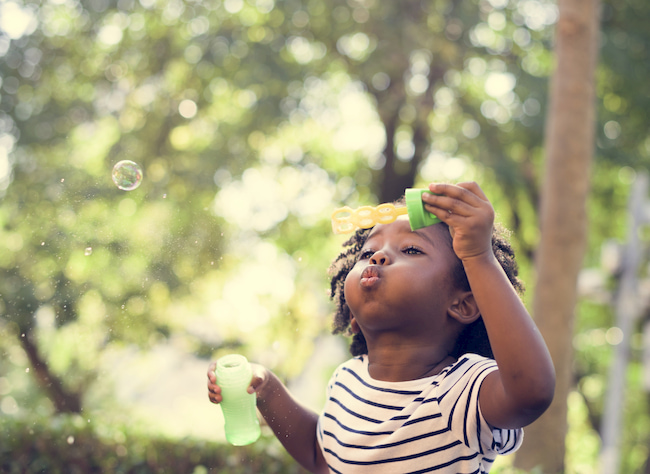When you see your little one playing make-believe, you may not immediately think about how it benefits his or her health and development. But the truth is that playtime offers a number of health benefits for kids.
While your kids’ playtime may seem inconsequential, it’s actually a significant piece of child development and health.
That’s why in this day and age when kids are spending more time inside sitting in front of a screen, it’s key to make sure your kids also spend time actively playing and using their imaginations.
How play benefits kids’ health
Beyond simply occupying your kids’ time and keeping you from hearing the dreaded “I’m bored,” playtime offers some serious benefits to kids. Childhood is a time of major growth and development. It’s also a time where healthy habits are established, and those can last a lifetime.
Let’s explore some of the many health-related benefits of play.
- Physical health. Play often involves physical activity. This one is really important. We mentioned above that kids often are spending time in front of a screen. Well, let’s emphasize that point: a new study just found that average daily sitting time for all Americans has increased by about an hour over the last decade. That’s a lot of time spent being sedentary, and it’s likely contributing to the obesity epidemic among our children. Playtime can help mitigate that somewhat, often allowing kids and teens to move around and be active rather than sitting still.
- Understanding and managing emotions. During playtime, kids often explore using their imagination. They may be creating imaginary worlds with dragons, teaching a classroom full of kids or playing in a toy kitchen. All of these activities help kids learn to handle the complicated feelings that will become commonplace as they get older. Beyond that, play also gives kids an opportunity to act out and express their feelings about other life situations they’re currently facing. That’s why roleplay and other similar activities often are used in therapy for children.
- Cognitive health and development. Spending time playing actually helps the brain develop, an important part of kids’ health and development. In fact, some studies have found that playtime in early childhood helps boost language, memory and learning by as much as 60 percent. And, playtime also promotes creativity, which in and of itself is a life skill in high demand.
- Development of social skills. Human interaction is a huge part of our everyday lives. Playing with others helps build the social skills that are needed to interact with others. Playtime with other kids will help your child learn how to share, collaborate and compromise. It also helps them build awareness of the feelings of others. Communication is also boosted by playtime since kids will be exchanging information in a variety of ways, including speech, signals and even writing. This play interaction boosts their communication skills since they exchange information verbally and non-verbally.
- Improved focus and attention span. Consider this: when you’re having a hard time focusing at work and take a break, do you find yourself more focused and productive afterward? In most cases, yes. The same phenomenon is true for playtime, including recess at school. Kids who have an opportunity to participate in unstructured playtime are more focused after playing than they were prior to playtime.
- Motor skill development. The development of motor skills is a big part of kids’ health, particularly in the pre-school years. Playing with toys and other objects can help kids boost both gross motor skills, which involve the movements of large body parts like the arms and legs, and fine motor skills, which are smaller movements in the hands, wrists and feet. Activities as different as coloring and running can help promote this same, important development.
What about outdoor play?
While play in general offers many kids’ health benefits, there are even more benefits when playtime is spent outdoors.
Kids playing outdoors are much more likely to be engaged in physical activity including running, jumping, catching, lifting and carrying things, all of which help build bone strength and those motor skills mentioned above. Children also tend to burn more calories while outdoors.
Little kids who spend time outdoors are also having their sensory skills actively developed. Just think about it — a toddler who’s playing outside may see new things like animals, be able to smell new things like flowers, want to touch objects to see how they feel, can hear new and different noises in the outdoors and may even be able to taste things occasionally, like a berry or freshly-picked fruit.
Beyond those benefits, spending time outdoors playing also exposes kids to natural, outdoor light, which stimulates the “pineal gland.” This important component in the brain helps keep the immune system strong and helps boost mood. That’s a win-win!
Playtime helps stimulate child development and boosts kids’ physical health, and regular checkups with the doctor can ensure your child stays on track. Learn more about Erlanger’s pediatric services here.







